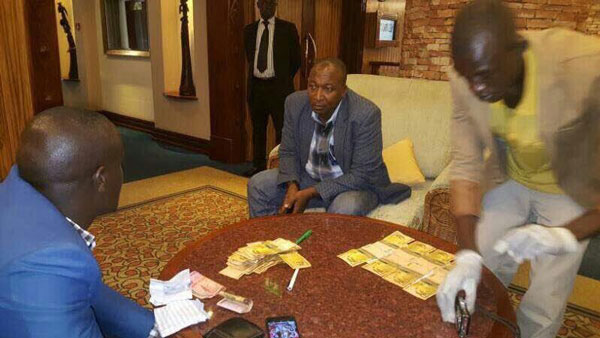
Uganda’s war on corruption takes new turn, minister charged
Kampala, Uganda | AFP | Uganda’s chief prosecutor on Tuesday charged a government minister with graft for allegedly taking a bribe from a businessman in exchange for clearing him of sexual harassment charges.
Herbert Kabafunzaki, a deputy labour minister, is accused of receiving a five million shilling ($1,381, 1,300 euros) bribe from a Sudanese businessman trying to rid himself of sexual harassment charges laid by a former employee, according to a charge sheet seen by AFP.
Top prosecutor Mike Chibita charged him with two counts of graft in an anti-corruption court in the capital Kampala.
Kabafunzaki’s arrest on Saturday was personally ordered by President Yoweri Museveni, said the leader’s press secretary Don Wanyama.
“The president was informed about the minister and he directed the police to take action. The police laid a trap and arrested the minister as he was receiving the bribe,” Wanyama said.
Allegations of official corruption are common in the East African country, which ranks 151 out of 175 countries surveyed in Transparency International’s annual corruption perceptions index.
Last week, Museveni said the country’s finance ministry was staffed by “thieving officials,” after two high-ranking employees were arrested for allegedly soliciting a $330,000 bribe from a Chinese investor.
The government has recently prosecuted several public officers on corruption allegations but netted few convictions.
Anti-graft advocates hailed the charges against Kabafunzaki but said the government needs to do more to cut down on bribery.
“Government has to go an extra mile to ensure all corruption cases are exposed and whoever is found guilty is dealt with in accordance with the law,” said Cissy Kagaba, head of Anti-Corruption Coalition Uganda.
“Ugandan tax payers lose billions of shillings through bribery and corrupt tendencies, but often culprits go scot-free.”
Country director for watchdog group Transparency International Peter Wandera questioned Museveni’s personal intervention in the case, saying it weakened rule-of-law overall.
“One wonders, have people lost interest in the system instead of going to the inspector general of government, or the police, they report to the president?” Wandera said.
 The Independent Uganda: You get the Truth we Pay the Price
The Independent Uganda: You get the Truth we Pay the Price


